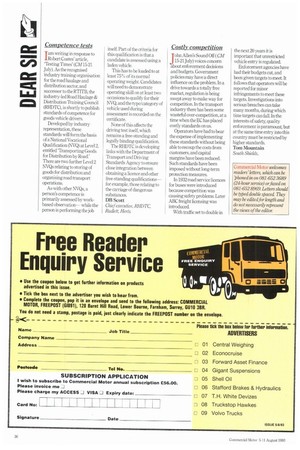Competence tests
Page 38

If you've noticed an error in this article please click here to report it so we can fix it.
Tam writing in response to Robert Coates' article, Testing Times (CM 15-21 July). As the recognised industry training organisation for the road haulage and distribution sector, and successor to the RTITB, the industry-led Road Haulage & Distribution Training Council (RHDTC), is shortly to publish standards of competence for goods vehicle drivers.
Developed by industry representation, these standards will form the basis of a National Vocational Qualification (NVQ) at Level 2, entitled 'Transporting Goods for Distribution by Road.' There are two further Level 2 NVQs relating to storing of goods for distribution and organising road transport operations.
As with other NVQs, a person's competence is primarily assessed by workbased observation— while the person is performing the job itself. Part of the criteria for this qualification is that a candidate is assessed using a laden vehicle.
This has to be loaded to at least 75% of its normal operating weight. Candidates will need to demonstrate operating skill on at least two occasions to qualify for their NVQ, and the type/categoryof vehicle used during assessment is recorded on the certificate.
None of this affects the driving test itself, which remains a free-standing and legally binding qualification.
The RHDTC is developing links with the Department of Transport and Driving Standards Agency to ensure close integration between obtaining a licence and other free-standing qualifications— for example, those relating to the carriage of dangerous substances.
DB Scott
Chief executive, RHInt, Radlett, Hots
Costly competition
John Allen's Sound Off ( CM 15-21 July) voices concern about enforcement decisions and budgets. Government policies may have a direct influence on the problem. In a drive towards a totally free market, regulation is being swept away to make way for competition. In the transport industry there has been some wasteful over-competition, at a time when the EC has placed costly standards onus.
Operators have had to bear the expense of implementing these standards without being able to recoup the costs from customers, and capital margins have been reduced. Such standards have been imposed without long-term protection measures.
In 1932 road service licences for buses were introduced because competition was causing safety problems. Liter ABC freight licensing was introduced.
With traffic set to double in the next 20 years it is important that unrestricted vehicle entry is regulated.
Enforcement agencies have had their budgets cut, and been given targets to meet. It follows that operators will be reported for minor infringements to meet these targets. Investigations into serious breaches can take many months, during which time targets can fall. In the interests of safety, quality enforcement is paramount, but at the same time entry into this country must be restricted by higher standards.
Tom Mountain
South Shields.












































































